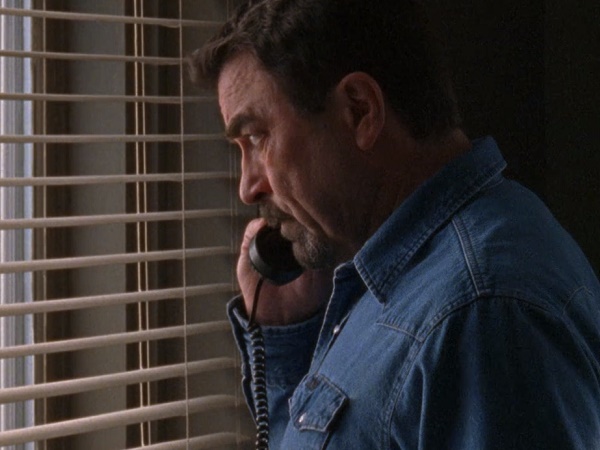Directed by Robert Harmon and starring Tom Selleck, Viola Davis, Kohl Sudduth, Kathy Baker, William Sadler, Sean Young, and William Devane, Sea Change is the fourth entry in the Jesse Stone movie series. The film – based on the book of the same name by Robert B. Parker – picks up after the events of Death in Paradise, with “Suitcase” Simpson in hospital as a result of life-threatening gunshot wounds.
With Simpson temporarily out of action, and officer Molly Crane on maternity leave, Jesse is short staffed. He is also struggling with his alcoholism, which has recently taken a bad turn due to complications in his relationship with his ex wife.
After a discussion with his psychiatrist, Jesse realises the best way to calm his recent spike in drinking is to keep himself busy. As such, he opens up an unsolved murder case to occupy his time and his mind.
In the midst of this old case, a young girl comes into the office and claims she has been raped. But with Jesse’s mind now on an unsolved murder from the past, as well as his own battles with alcohol, can he focus his attention on this case too?

In the three previous Jesse Stone movies, Jesse’s alcohol addiction has been an important aspect of his character. It has been touched upon here and there, largely as a background detail, and often as a way to describe who he is when he’s not at work.
In Sea Change, this addiction is brought to the forefront and made a key component of the narrative. In this movie, Jesse is struggling with alcohol so much, that he actively seeks out ways to distract himself and ensure he doesn’t spend another night polishing off a bottle.
This adds an interesting insight into his character. Audiences are aware of Jesse’s addiction, but the suggestion here is he can only really keep it under control from working excessively.
Jesse needs his work to maintain his sobriety. He is dependent on his job, and without it he will spiral.

By placing Jesse’s alcohol problem at the front and centre of the story, Sea Change feels like a movie which is shifting gears from what has come before. Sure, this is still the same Jesse Stone, and the tone and style of the film is very much in keeping with previous instalments, but there is a sense we are now digging deeper into his character.
We are peeling back layers. It’s slow going, but each new entry reveals something more.
There is also the sense that change is coming in the wider world of Jesse Stone. As much as things stay the same, the Jesse Stone films are making a few adjustments in order to move the series forward.
The first of these adjustments is the departure of Viola Davis’ character, Molly Crane, who only appears once in the film in what is her final appearance in the series. Crane is given an exit of sorts, presumably to give Davis the opportunity to become the Hollywood star she is now, and while her departure scene is short, and not really a departure at all, it gives her a way out.
The second adjustment is the characterisation of “Suitcase” Simpson, who becomes quirkier following his stay in hospital. After waking from a coma, Simpson gets a personality reboot which makes him stand out a little more.
Simpson is a likeable character, but there has always been the worry he could easily fade into the background. In Sea Change he is given a slight tweak to his personality, and this seems to be exactly what’s needed for the character.
Meanwhile, the third adjustment is the introduction of officer Rose Gammon, as played by Kathy Baker. Gammon effectively takes over from Molly Crane as Jesse’s go-to police officer, and there’s an instant rapport between Baker and actor, Tom Selleck.
Rose Gammon becomes a mainstay of the series from here on out and this is a good starting point. Her introduction is effortless and written as though she has always been a part of the series.

Outside of the above, Sea Change is pretty much business as usual. The film delivers the same level of enjoyment as its predecessors, with Selleck being the big draw for a fourth time, and Robert Harmon’s direction remains consistent.
The unsolved murder plot, which becomes the ongoing story beat in Sea Change, doesn’t feel quite as strong as some of the crime stories in the other films, but it works fine enough. The focus of this film really is the alcohol addiction and that’s where the best material lies.
All-in-all there’s a good balance of story and characterisation, and even though the series is now four films in, there’s the general feeling the movies have barely scratched the surface. Another solid entry from Jesse Stone.
Should you wish to check out Sea Change, the movie is available on digital download and DVD from all good entertainment retailers, including Amazon US.
—
Disclaimer: I earn a commission for products purchased through some links in this article.
__
—
Thank you for taking the time to read this review on It’s A Stampede!. For more reviews, check out the recommended reads below.

Leave a comment